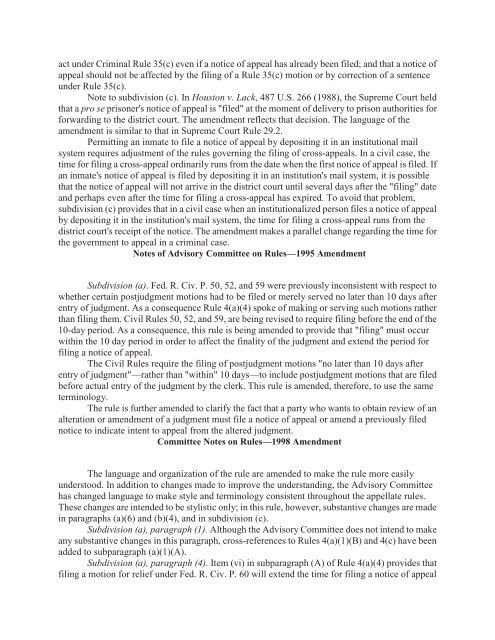Federal Rules of Appellate Procedure 2014-2015, 2014a
Federal Rules of Appellate Procedure 2014-2015, 2014a
Federal Rules of Appellate Procedure 2014-2015, 2014a
Create successful ePaper yourself
Turn your PDF publications into a flip-book with our unique Google optimized e-Paper software.
act under Criminal Rule 35(c) even if a notice <strong>of</strong> appeal has already been filed; and that a notice <strong>of</strong><br />
appeal should not be affected by the filing <strong>of</strong> a Rule 35(c) motion or by correction <strong>of</strong> a sentence<br />
under Rule 35(c).<br />
Note to subdivision (c). In Houston v. Lack, 487 U.S. 266 (1988), the Supreme Court held<br />
that a pro se prisoner's notice <strong>of</strong> appeal is "filed" at the moment <strong>of</strong> delivery to prison authorities for<br />
forwarding to the district court. The amendment reflects that decision. The language <strong>of</strong> the<br />
amendment is similar to that in Supreme Court Rule 29.2.<br />
Permitting an inmate to file a notice <strong>of</strong> appeal by depositing it in an institutional mail<br />
system requires adjustment <strong>of</strong> the rules governing the filing <strong>of</strong> cross-appeals. In a civil case, the<br />
time for filing a cross-appeal ordinarily runs from the date when the first notice <strong>of</strong> appeal is filed. If<br />
an inmate's notice <strong>of</strong> appeal is filed by depositing it in an institution's mail system, it is possible<br />
that the notice <strong>of</strong> appeal will not arrive in the district court until several days after the "filing" date<br />
and perhaps even after the time for filing a cross-appeal has expired. To avoid that problem,<br />
subdivision (c) provides that in a civil case when an institutionalized person files a notice <strong>of</strong> appeal<br />
by depositing it in the institution's mail system, the time for filing a cross-appeal runs from the<br />
district court's receipt <strong>of</strong> the notice. The amendment makes a parallel change regarding the time for<br />
the government to appeal in a criminal case.<br />
Notes <strong>of</strong> Advisory Committee on <strong>Rules</strong>—1995 Amendment<br />
Subdivision (a). Fed. R. Civ. P. 50, 52, and 59 were previously inconsistent with respect to<br />
whether certain postjudgment motions had to be filed or merely served no later than 10 days after<br />
entry <strong>of</strong> judgment. As a consequence Rule 4(a)(4) spoke <strong>of</strong> making or serving such motions rather<br />
than filing them. Civil <strong>Rules</strong> 50, 52, and 59, are being revised to require filing before the end <strong>of</strong> the<br />
10-day period. As a consequence, this rule is being amended to provide that "filing" must occur<br />
within the 10 day period in order to affect the finality <strong>of</strong> the judgment and extend the period for<br />
filing a notice <strong>of</strong> appeal.<br />
The Civil <strong>Rules</strong> require the filing <strong>of</strong> postjudgment motions "no later than 10 days after<br />
entry <strong>of</strong> judgment"—rather than "within" 10 days—to include postjudgment motions that are filed<br />
before actual entry <strong>of</strong> the judgment by the clerk. This rule is amended, therefore, to use the same<br />
terminology.<br />
The rule is further amended to clarify the fact that a party who wants to obtain review <strong>of</strong> an<br />
alteration or amendment <strong>of</strong> a judgment must file a notice <strong>of</strong> appeal or amend a previously filed<br />
notice to indicate intent to appeal from the altered judgment.<br />
Committee Notes on <strong>Rules</strong>—1998 Amendment<br />
The language and organization <strong>of</strong> the rule are amended to make the rule more easily<br />
understood. In addition to changes made to improve the understanding, the Advisory Committee<br />
has changed language to make style and terminology consistent throughout the appellate rules.<br />
These changes are intended to be stylistic only; in this rule, however, substantive changes are made<br />
in paragraphs (a)(6) and (b)(4), and in subdivision (c).<br />
Subdivision (a), paragraph (1). Although the Advisory Committee does not intend to make<br />
any substantive changes in this paragraph, cross-references to <strong>Rules</strong> 4(a)(1)(B) and 4(c) have been<br />
added to subparagraph (a)(1)(A).<br />
Subdivision (a), paragraph (4). Item (vi) in subparagraph (A) <strong>of</strong> Rule 4(a)(4) provides that<br />
filing a motion for relief under Fed. R. Civ. P. 60 will extend the time for filing a notice <strong>of</strong> appeal


















